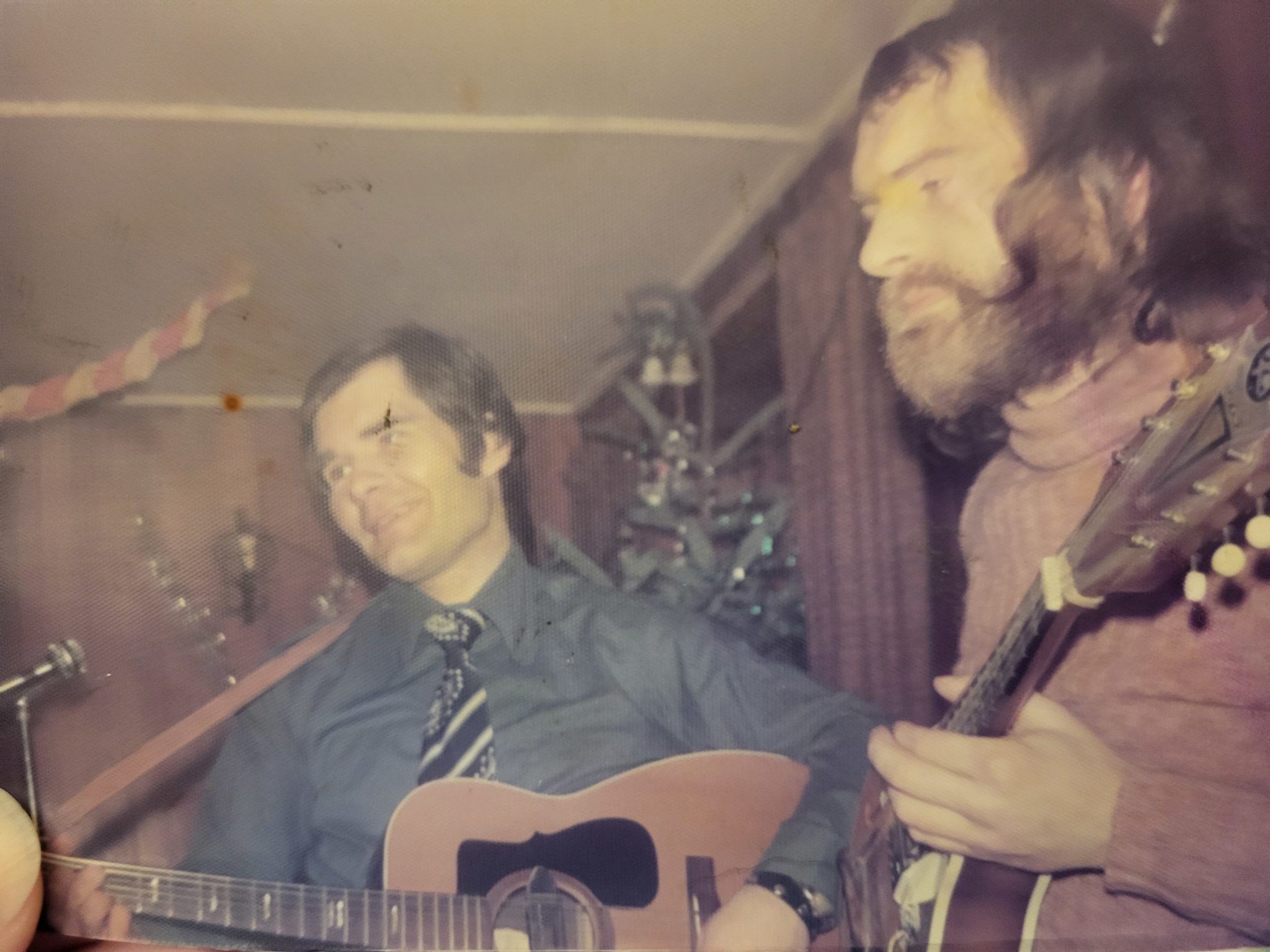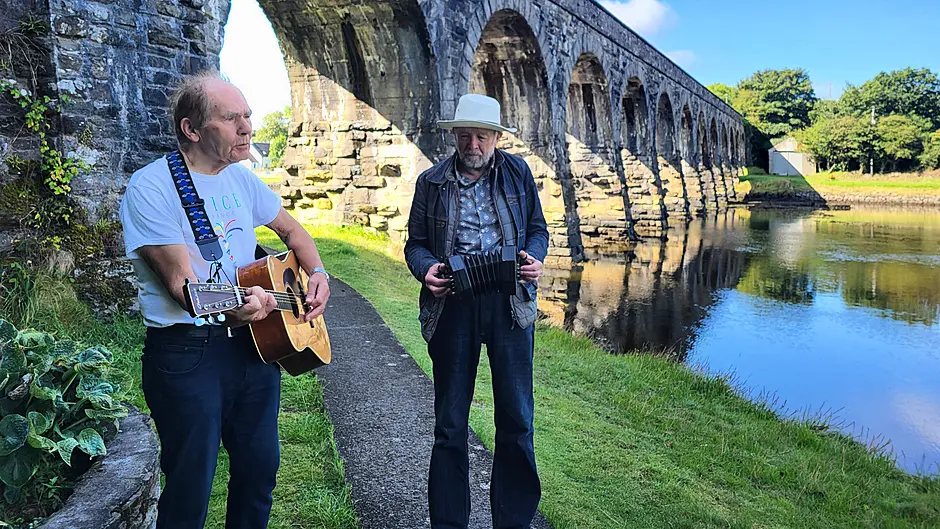A collection of new folk songs ensures some of Ballydehob’s best-loved and most colourful locals are now immortalised, writes Sarah Canty
A WEST Cork musician has released a collection of songs – and one poem – devoted entirely to his hometown.
Heroes comprises 11 songs written by Ken Pollard, which he says, is ‘in appreciation and remembrance of some of the great characters from our village, past and present. I’m hoping that these songs will help to keep their memory alive.’
Ken spoke to The Southern Star, with his friend Dick Miles, at the foot of the 12-Arch bridge, enthusiastic to explain how long this project had been in the making and how much it means to him.
Born and raised on the Main Street, Ken grew up where his grandparents had a general store – selling all sorts of things, including meal for farm animals.
His father, Jack, came to Ballydehob as a young man, married Gwendolyn, and taught at ‘the Number 2 school’ on the Durrus Road, now known as St Matthias NS.
 Ken Pollard and his brother Donie play a gig in a local pub in the 1970s under the name of Ghost of a Flea.
Ken Pollard and his brother Donie play a gig in a local pub in the 1970s under the name of Ghost of a Flea.
As was sometimes the custom for some families, Ken was sent boarding to a secondary school in Dublin, which left him with ‘no good memories.’
But the home place always remained Ballydehob and West Cork where he and his brother enjoyed playing and singing on stage, at various local pubs and venues as young men.
The possibility of recording his own songs had been suggested over the years and finally, last year, his friends in the Sandboat convinced him to go for it.
One friend, JP O’Brien, went as far as calling the recording studio to initiate the process. Ken invited his friend Dick, an accomplished musician and founder of the Fastnet Maritime Folk Festival, to accompany him on
concertina and banjo.
The result is a formidable collection of folk songs. Ken’s tunes are sometimes melancholic, other times upbeat, and every time delivered with expert musicianship and a familiarity that encourages an old sing-a-long.
 Stevie Lynch, a prominent and active member of the community was instrumental in getting the Ballydehob Buffet Recipe Book published in 2006.
Stevie Lynch, a prominent and active member of the community was instrumental in getting the Ballydehob Buffet Recipe Book published in 2006.
The lyrics are nostalgic accounts of some of the main characters Ken and his boyhood pals knew – ‘people we looked up to and admired in our early years.’
Some of the stories may have been slightly embellished, although which ones are only for Ken and his contemporaries to know. For example, the leading man in the Ballad of
Jim Pyburn, sounds as if Jim may have had a cantankerous nature and an itchy trigger finger.
‘The first time I sang this song, many years ago in Gabe’s Place, I wondered why it got such a rapturous ovation – then I noticed Jim Pyburn sitting at the bar sipping a pint of porter,’ recalls Ken, suggesting Jim’s nature was probably more laid back than the lyrics suggest!
Other stories come straight from the heart, wistful recollections of a simpler time. David Foley was a man of many talents. ‘He had a shop on the Main Street and a bakery behind the shop with a full-time baker there. He played piano and he used to play the organ in the church. I would always hear him playing music from the main street,’ recalls Ken.
Growing up, Ken loved to hear him play a certain tune – ‘name unknown but forever remembered.’ The song entitled David Foley was inspired by that very tune, in hopes that the melody will live on. A pure continuation of the Irish tradition that retains history in song form so it can be remembered
forever.
 Jim Pyburn at the Innishannon Steam Rally in 2004.
Jim Pyburn at the Innishannon Steam Rally in 2004.
Other songs are just plain old fun. The Mount Gabriel Song recalls the treacherous conditions under which Greg Coughlan and company built the road up to Mount Gabriel in the early 1970s. So dangerous was the job that Greg had to place ‘help wanted’ ads in The Southern Star and further afield, just to find someone to drive the Himac. Legendary Main Street draper, Jackie Farrell, also sold life insurance at that time, and didn’t miss a trick trying to sign these boys up for a policy.
In another crackin’ ditty of five versus, Stevie Lynch once thought he could fly. In another, old Tom Vaughan wanted to place an ad in The Southern Star to find a speckled hound he had lost.
In another, Ken and his young friends were intrigued by the first vegetarian to arrive in Ballydehob, who feasted on nettles and was much-beloved by his livestock who would come to no harm under his watch.
 Tom Vaughan who owned the feed store on Main Street, ran in later years by his son Brian Vaughan, used to go fowling every Sunday during shooting season with Jack Pollard and Pat Sweeney. Ken and his brother used to tag along- all travelling in Tom’s Bedford van.
Tom Vaughan who owned the feed store on Main Street, ran in later years by his son Brian Vaughan, used to go fowling every Sunday during shooting season with Jack Pollard and Pat Sweeney. Ken and his brother used to tag along- all travelling in Tom’s Bedford van.
These songs really are just glimpses into the everyday lives of a few folks who once were the movers and shakers and neighbours and friends of a simple village not so long ago, many of whom have left their own legacies in one way or another.
‘It’s about the whole community,’ observes Dick. ‘It’s great to have something like this to remember the people who have been and it’s all about the local community, I think.’ Ken agrees – that’s how it was intended.
As the conversation flows under the 12-arch, several people walking by stop to have the chat with Ken, or ‘Kenneth’, as one called him. He wasn’t shy to remind them that he has a CD out now and not to forget to buy it.
‘Bridie has ‘em up at the craft shop… only a tenner and all the local songs are on it.’








